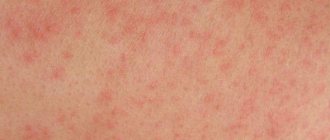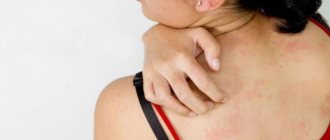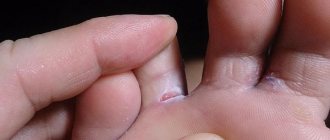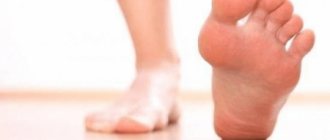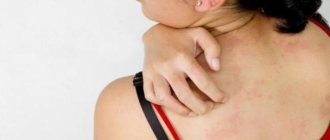One of the most common complaints with which patients come to a dermatologist is itchy skin. As a rule, this symptom is accompanied by a rash, but in some cases there is so-called isolated itching, which is not accompanied by a rash.
This article will discuss what can cause itchy skin without a rash, what diseases can manifest themselves in this way, and how to get rid of unpleasant sensations.
What is itching
Itching is an intense sensation or tingling sensation in the upper layer of the epidermis. It can occur both on the surface of the skin and on the mucous membranes. Chronic itching can have an extremely negative impact on the quality of life: it causes sleep disturbances, worsens mood, reduces performance, and can provoke depression. The scratched areas can become inflamed, which causes further deterioration in health.
Itching can be local if it occurs in certain areas of the body, as well as generalized if discomfort is felt over the entire surface of the body. Itching often accompanies systemic diseases and can be one of the early symptoms of a number of serious health problems.
Content:
- What is itching
- Possible causes of itching without rash
- Itching as a symptom of disease
- Itching during pregnancy
- Senile (senile) itching
- Itching at night
- Other reasons
- Diagnosis of itching without rashes
- Treatment of itching without rash
Depending on how severe the process is, the itching can be acute or chronic. Acute manifestations of the symptom are usually provoked by allergens: pet hair, plant pollen, food, dust, medications. Chronic itching is most often a manifestation of diseases that are not related to dermatology. Therefore, if the discomfort does not go away and becomes more intense, you should seek medical advice. In particular, you should definitely visit a doctor if itching lasts more than fourteen days, disturbs night sleep, occurs for no reason, or is accompanied by other symptoms (weight loss, fatigue, fever).
General information
Skin itching is one of the interdisciplinary problems that are relevant both for dermatovenerology and allergology, endocrinology, infectology, and oncology.
Some forms of itching (anal itching, scrotal itching, vulvar itching) are considered in ICD-10 as independent nosologies. Itchy conditions are more often diagnosed in women. Frequent background factors are low socioeconomic status, depressive states, constant stress, periods of hormonal changes (pregnancy, menopause). Depending on the course, skin itching can be acute (sudden, short-term) and chronic (long-term, debilitating), according to the area of the itchy surface - localized (local) and generalized (diffuse). According to the mechanism of occurrence, skin itching is divided into:
- pruritoceptive (due to skin diseases);
- systemic (due to general diseases);
- psychogenic (due to mental disorders);
- neurogenic (due to damage to the nervous system).
Itching as a symptom of disease
If the itching sensation bothers you for a long time, but there are no other signs of allergy (rashes, lacrimation, runny nose), it is necessary to check the condition of the internal organs. Sometimes, in order to get rid of unpleasant sensations, it is enough to make adjustments to the diet or stop using certain medications. However, in some cases, itching can be a symptom of a serious illness, and therefore you should not delay visiting a doctor.
Cirrhosis and hepatitis
More than one hundred thousand people fall victim to liver cirrhosis every year. The prognosis for this disease is extremely unfavorable, especially if not only the liver, but also the nervous system suffers. With progressive cirrhosis, the life expectancy is about five years, and if the patient ignores the doctor's instructions, death can occur much earlier.
The danger of cirrhosis is that in the early stages it is practically asymptomatic. The only sign that makes it possible to suspect that something is wrong with the liver is generalized itching. The cause of its occurrence is a condition when liver cells are gradually destroyed, as a result of which the organ loses the ability to fully cleanse the blood of poisons, toxins and substances that provoke allergies.
Doctors note that with cirrhosis, itching begins suddenly. Most often, the palms and soles of the feet begin to itch, and in later stages of the disease, the itching “spreads” throughout the body.
Note that itching can also be one of the first signs of hepatitis, which manifests itself long before the yellowing of the skin and sclera. Therefore, when itching of unknown etiology appears, it is necessary first of all to exclude liver disease by undergoing all the necessary studies.
Diabetes
Itching caused by diabetes is localized. It occurs most often in the area of the elbows, palms, feet, and also on the genitals. Often a similar symptom is diagnosed in young patients. Another group of patients in whom diabetes mellitus often manifests itself as a burning sensation are women of retirement age. In men, this symptom occurs less frequently.
It is worth noting that increased discomfort with diabetes may indicate that the level of glucose in the blood has increased sharply. Therefore, if the urge to scratch becomes irresistible, it is urgent to measure your blood sugar.
Kidney diseases
Unpleasant skin manifestations often accompany chronic renal failure. The intensity of itching increases with impaired renal function. In this case, the itching can be either generalized or limited to the back and forearms.
Depression and psychosis
Psychoemotional disorders are another common cause of itching. In people with increased lability of the nervous system, aggravation of skin manifestations can be caused by the slightest stress.
Often itching is one of the symptoms of a depressive disorder. In this case, you should not delay your visit to the doctor. It has been proven that depression is not just a “disorder” and a “bad mood”, but a serious illness that needs treatment. In depressive disorder, itching is accompanied by frequent mood swings, sleep problems, anxiety, panic attacks, and obsessive thoughts.
In depression, itching is generalized. Skin manifestations can appear at any time, both on the skin and mucous membranes.
In psychosis, itching is a common symptom in women over forty years of age. As a rule, it occurs on the scalp. Patients complain of sensations similar to “crawling bugs.” Clinicians call this phenomenon “tactile hallucination.”
Oncological diseases
Malignant tumors are the most dangerous disease that can manifest itself with itching without rashes. Therefore, people who have a genetic predisposition to cancer should treat all skin manifestations very carefully.
In the early stages, cancer is often completely asymptomatic. Itching may be the only sign of malignancy. Medicine knows of cases where itchy skin appeared five to six years before the tumor was discovered.
Itching that accompanies tumors can occur with any malignant tumors, but is most often observed with cancer of the pancreas and intestines, as well as the genitourinary system. The whole body may itch, but in some areas the discomfort is more pronounced. Thus, local itching can be felt on the front surface of the legs, on the chest and on the inner thighs. When the tumor is removed, the itching may disappear, but doctors know of cases where the itching persisted after cancer was cured.
Itching in malignant tumors can occur as a result of radiation therapy, symptomatic treatment, and also as a result of the action of toxic products of tumor cell necrosis. Metabolic changes that accompany the tumor process can also manifest themselves in a similar way: dry skin, iron deficiency, etc.
Parasite infestation
About a third of cases of itching without rashes are caused by helminthic infestation. It is believed that children are more often infected with helminths, but this disease is diagnosed in patients of any age. Worms enter the body from dirty hands, through contaminated water and spoiled food. The burning sensation in this case can be either localized in the anus and genital area, or generalized throughout the body.
Blood diseases
Reduced iron levels in the blood and iron deficiency anemia can also be accompanied by itching. As a rule, it occurs in areas where blood circulation is increased. This could be the chest, genitals, or pelvic organs. In case of anemia, itching is accompanied by other characteristic symptoms - frequent migraines, dizziness, pallor, changes in taste.
Thyroid diseases
Generalized itching for a long time can be a manifestation of thyrotoxicosis. As a rule, patients who have been diagnosed with diffuse thyrotoxic goiter, which has not been treated for a long time, complain of a burning sensation. It is believed that in case of endocrine system failure, the cause of itching is more intense blood flow in the skin and an increase in skin temperature.
With hypothyroidism, intense “itching” occurs due to dry skin.
Nervous system diseases
Itching caused by neurological diseases is uncommon. One of the causes of neuropathic itching may be postherpetic neuralgia. In this case, the burning sensation is accompanied by pain.
Quite often, a burning sensation and discomfort at the medial edge of the scapula are diagnosed. This phenomenon is called notalgia paresthetica. This is one of the types of peripheral neuropathy.
Short-term but very intense itching is often observed in patients with multiple sclerosis. Its duration can range from a few seconds to a couple of minutes.
What is the reason for the increase in symptoms at night?
The cause of itching in the evening or at night is of interest to many. As experts explain, the background of this phenomenon has not been fully studied, but, presumably, a change in the circular rhythm is considered to be the culprit for this situation. This complex term, unknown to the ear, refers to the body's normal "internal clock".
It is responsible for various biological processes that occur at certain times of the day and are not associated with sleep or eating. According to this theory, the processes for which the circus rhythm is responsible have a direct impact on the occurrence of night itching:
- An evening increase in skin temperature, characteristic of every person, increases the level of enzymes contained in it, which mediate the occurrence of unpleasant sensations.
- At night, the process of water loss in the skin intensifies, which causes dryness and, as a result, increased negative effects of environmental irritants.
- At night, people have a lower pain threshold, which causes a more intense itching sensation.
- Changes in the autonomic nervous system, characterized by an increase in parasympathetic activity responsible for itching, also occur at night.
All of these factors indicate the influence of circus discomfort on appearance, that is, on our internal clock.
Itching during pregnancy
Expectant mothers often complain about itching. Skin manifestations during pregnancy are triggered by hormonal changes. This is considered normal, so unless there are other symptoms, there is no cause for concern.
A number of pregnant women complain of itching on the abdomen, especially in the last trimester. This is caused by stretching of the skin, so the unpleasant sensations will completely go away only after childbirth, when the stomach returns to its previous size.
Cholestasis can also cause itching in pregnant women. As a rule, bile begins to enter the lumen of the duodenum in smaller quantities already in the second or third month of pregnancy. In later stages, its manifestations become more intense. The exact mechanism of cholestasis in pregnancy has not been established.
Senile (senile) itching
Age-related itching is considered very common. About half of people who have celebrated their seventieth birthday complain of skin manifestations. This is due to a number of reasons, the main of which is considered to be loss of moisture and dry skin, which loses the ability to retain fluid, as well as decreased function of the sweat and sebaceous glands. Senile itching is provoked by changes in hormonal levels, as well as a decrease in the production of elastin and collagen.
In addition, older people are often diagnosed with problems with the liver and kidneys, as a result of which the blood is not sufficiently cleansed of toxins and allergens. They begin to accumulate in the body, causing skin manifestations.
Senile itching is usually of medium intensity. It does not cause any particular discomfort.
Changing your diet will help reduce discomfort. In particular, it is recommended to add meat, fish, fruits and herbs, as well as dairy products to the menu. In addition, the use of cosmetics for particularly sensitive skin is recommended.
It should be noted that senile itching is a so-called “diagnosis of exclusion.” In other words, before attributing unpleasant skin manifestations to the patient’s age, the doctor must make sure that there are no pathologies that could cause this symptom.
Other reasons
Other reasons can also provoke itching without the appearance of rashes and other symptoms.
Aquagenic itch
Doctors consider the so-called aquagenic itch to be a fairly common phenomenon. This is the name for the tingling and burning sensations that occur after human skin comes into contact with water.
Typically, aquagenic itching occurs two to five minutes after taking a shower or bath and lasts from ten minutes to an hour. This condition is chronic and extremely unpleasant for the patient.
Experts have not yet been able to establish the pathogenesis of aquagenic itching. It is noteworthy that antihistamines do not relieve this symptom.
Incorrectly selected cosmetic products
Often the cause of itching without other symptoms is incorrectly selected cosmetics. Unpleasant skin manifestations can be caused by products in which the content of fragrances and dyes is “off scale”. Doctors know of cases where even scented toilet paper, let alone soap, shower gels, shampoos and creams, became the cause of skin irritation. Therefore, dermatologists recommend choosing fragrance-free products designed for very sensitive skin.
Taking medications
Sometimes itching can be caused by certain medications. The peculiarity of such skin manifestations is that they can be very intense and are difficult to control with antihistamines. As a rule, some antibiotics, antifungals, and narcotic painkillers can cause itching. Also, “scratching” can be caused by medications containing estrogen and anabolic steroids. In addition, contraceptives in tablet form may be the “culprit” for unpleasant skin sensations.
Diagnosis of itching without rashes
In order for the treatment to be as effective as possible, the root cause of the itching should first be established. The optimal solution for the patient is a visit to a dermatologist. The doctor will conduct a survey, determine what examinations need to be completed, and may also recommend consultations with specialized specialists, for example, an allergist, endocrinologist, oncologist, etc.
The initial step is collecting an anamnesis. The specialist will need to obtain detailed information about the following nuances:
- How the symptom first appeared: acutely or gradually.
- Is the itching localized or is the patient itching “from head to toe?”
- How severe is the symptom?
- Are there any daily or seasonal variations in what time the sensations are most intense?
- Is there a relationship between skin manifestations and contact with water?
- What factors increase discomfort?
- Is there a connection between the symptom and the patient’s activities, profession, hobbies and lifestyle.
- Has the patient recently experienced any traumatic situations?
- What medications is the patient taking?
- What diseases did the patient suffer?
The next stage of diagnosis is a visual examination of the patient and the appointment of medical tests. The specialist will examine the skin, check whether there is a “jaundiced” tint characteristic of hepatitis, fungus on the nails, and whether the color of the sclera of the eyes is changed. The doctor will assess the state of the endocrine system by the presence or absence of limb tremors and possible disturbances in thermoregulation. Without fail, the doctor must find out whether the lymph nodes are enlarged.
The list of tests that your doctor may recommend varies. Most often we are talking about a clinical blood test, a general urine test and a biochemical blood test. Also included in the list of tests are liver tests, checking the levels of glucose and cholesterol, urea, total protein and protein fractions. It is mandatory to check the saturation of red blood cells with iron and the level of iron in the blood.
A chest X-ray, a thyroid examination, and a stool test for parasites are performed.
To exclude certain diseases, the doctor may prescribe a variety of specific studies:
- Ultrasound and biopsy to exclude liver diseases.
- Biopsy and pyelography to rule out kidney problems.
- Vitamin B12 level testing, lymph node biopsy, spinal x-ray to exclude blood diseases.
- Ultrasound of the abdominal organs to exclude malignant tumors.
- Consultation with a psychiatrist to rule out mental problems.
Basic treatment for the problem
Itching that occurs at night is always very disturbing and can not only disturb the victim’s peace, but also significantly worsen his general condition. In some cases, people suffering from this plague become depressed or, conversely, experience uncontrollable anger. Therefore, finding the true cause of the disease and eliminating it is very important. Although it often takes a long time, this waiting period is completely worth it.
Everyone knows that after eliminating the cause that causes itching in the body without a rash or with a rash that occurs in the dark, complete relief and peace will come. To achieve this goal, a complete diagnostic examination is required, and then comprehensive treatment, including pharmacological therapy in combination with nutritional correction. Basic treatment consists of the following components:
- To reduce the negative sensations that torment the patient during the evening and night, experts recommend taking antipruritic medications.
- If a pronounced skin rash appears due to an unspecified allergy, it is recommended to use antihistamines, powders that should be sprayed directly onto the affected area, as well as creams and ointments with a cooling and moisturizing effect.
- If a person has an inflammatory process, a specialist should prescribe non-hormonal anti-inflammatory drugs and local steroids.
All drug prescriptions must be based on proper nutrition. Diet correction involves eliminating salty, spicy and spicy foods from the diet.
It is also not recommended to consume foods that can cause allergies and strong coffee. As for alcoholic beverages, they are strictly prohibited. In addition to following a diet, patients prone to night itching are advised to adhere to the following rules:
- Avoid prolonged contact with hot or cold water;
- Cleaners, detergents and detergents should only be used with rubber gloves to avoid direct contact with skin.
All unpleasant sensations that occur at night can be either mild, painless, or dangerous to your health. Therefore, to eliminate it you need the help of a specialist. An experienced doctor will do everything in his power to determine as accurately as possible the factor that caused the development of the disease. The doctor will also select medications that will quickly get rid of nighttime itching and return the person to healthy sleep.



